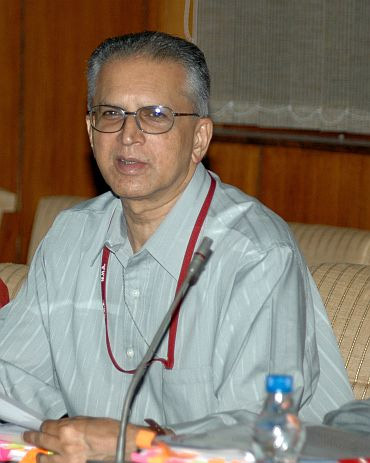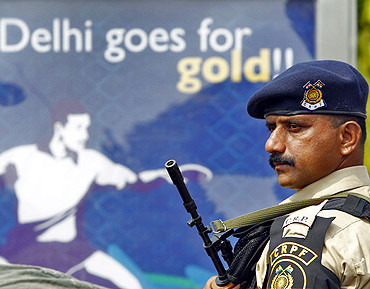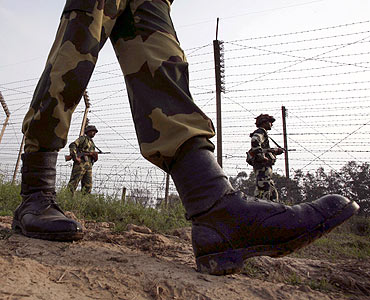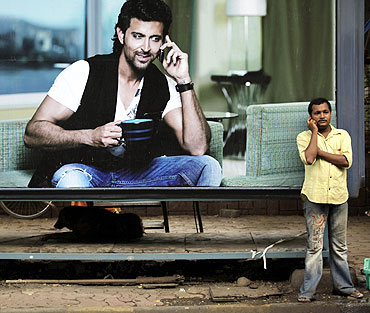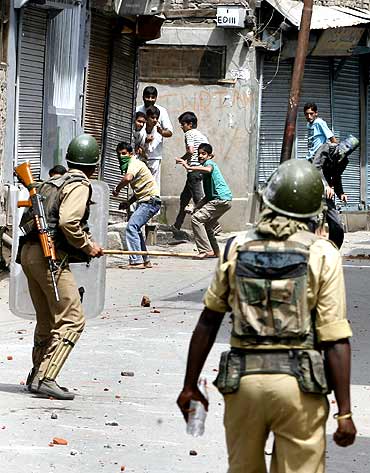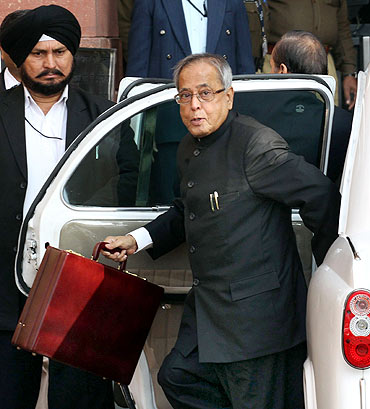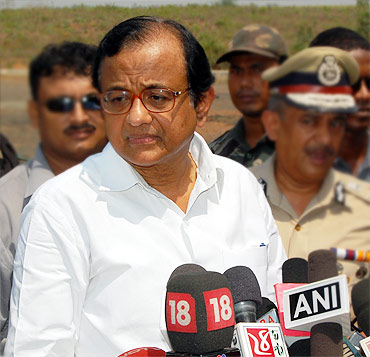 | « Back to article | Print this article |
Exclusive! Home Secretary G K Pillai on his tenure
Union Home Secretary Gopal Krishna Pillai is retiring on June 30 after 39 years in service. Bureaucrats in India are made of hard stuff but Pillai injected some soft power to the job by making the home ministry accessible to the media, by responding on his cell phone all the time, by giving quotes to television cameras parked outside his office and by implementing policy to the satisfaction of his boss, Home Minister P Chidambaram.
Pillai and his wife Sudha, also an IAS officer now retired and re-inducted into the Planning Commission, were dubbed as the "power couple". What worked for Pillai was his level of confidence in what he was doing. His father and grand-father were also civil servants.
Pillai knew how to approach files and dispense it with efficiency. He was quite clever, like many Indian bureaucrats, in not treading on political landmines. He earned kudos when he was joint secretary in charge of the north-east (1996-2000). He showed sensitivity in his approach and tried to bring the north-east closer to New Delhi.
As commerce secretary his stint got a mixed response. His penchant to fast-track approval for SEZs made many farmers, NGOs and activists unhappy. As commerce secretary his total commitment to the government policy on privatisation and liberalisation in the ministry made him unpopular amongst poor farmers and NGOs fighting for land rights.
However, no one can doubt that the man knew his job and also its potential early in life.
As district collector of Quilon, Kerala (1982-85) he showed his mettle. He helped Kerala's cashew, coir and handlooms industries in a big way.
As his distinguished career comes to an end, in a conversation with rediff.com's Sheela Bhatt, he shared a few thoughts on the socio-economical turbulence that India can't escape, on his boss P Chidambaram's intellectual honesty, on the Maoists unacceptable agenda and the important police reforms that he tried to implement.
'Unless you have well-trained policemen, you have lost half the battle'
You were a richly-experienced bureaucrat before you became home secretary. What are the new things about India that you learned while sitting on this chair, particularly about India's law and order and internal security situation?
This was a very hectic, very tiring and very challenging assignment. We had our share of troubles, left-wing extremism and getting our act together in terms of shaping policy. I think, the most suffering I have gone through is due to lack of sleep. I think, throughout this assignment I have managed just five hours of sleep daily. I want to catch up on my lost sleep when I retire (laughs).
I think, my assignment has been satisfying. We have managed to put key focus on law and order and we have managed to keep the focus on important police reforms. Primarily, making sure that the recruitment of policemen is made more transparent and merit-based. If recruitment is not proper we will have weak characters remaining in the system. That is something which we have tried to tell our states.
We have tried to augment the capacity of the training system, substantially. Thanks to Vijay Kelkar of the 13th Finance Commission who provided us with Rs 2,200 crore for building up better infrastructure for police training institutions in the states.
We have vastly improved the training institutes of Border Security Force, Central Reserve Police Force, Indo Tibetan Border Police. I believe that unless you have well-trained policemen, you have lost half the battle.
If you look back at the last two years, what is your most important achievement?
You can't quantify. In the home ministry, when you come to office you never know how your day would end unlike the commerce ministry when I knew what and how I will do things in office hours. The developments of the day overshadowed my planning. It can be Gorkhaland, Telangana, the north-east, Maoists or Kashmir.
'We don't have a consensus on how to tackle left-wing extremism'
Which was the current affairs issue in which you invested your heart and brain, both?
I would say getting many difficult things through. Like, the merit-based system in police recruitment to which home minister was deeply committed to. I took a personal interest in improving the training of policemen. When the 13th Finance Commission was almost ready to file its report to the government, Kelkar included our request for funds for police training. We went at the last minute and he still incorporated it. In the home ministry we took key decisions within time-limits in spite of many problems.
What are your regrets?
I think, we don't have a consensus on how to tackle left-wing extremism.
We have not been able to get it in order. Not only amongst our political parties, even in the government itself, there is a lack of consensus. There is delay in the National Intelligence Grid and National Counter-Terrorism Centre. The NCTC hasn't yet come up. In fact, the NCTC is in limbo. The NATGRID is approved in principle but it's delayed substantially.
What could you not accomplish in spite of trying hard?
I think the Delhi police bill which I wanted to complete with all the elements of police reforms that we have envisaged. We wanted to make it the model bill for the rest of the country. Now, the draft resolution is ready and has gone to the law ministry.
The issues are resolved and it will take six months more. I would have loved to have done it when I was home secretary. It gives more independence to the police, it involves issues of fixed tenure, better system of recruitment, training and transfers. It has police accountability, community policing etc.
'The coming decades will be turbulent for India'
After the 26/11 attacks on Mumbai, we heard lots of big talk but slowly it seems that policing has slipped into the old mould. Even the murder of journalist J Dey points to that. India looks less and less safe.
I agree with you but you must look at it like this. This is a country where 50 percent of the population is below the age of 25. You are growing at nine percent economic growth. There is the information revolution. There is the communication revolution taking place where you have got 600 million mobile phones and instant knowledge and information in every hand holding it. There are rising aspirations of the youth.
So, you are going to get what I always call 'turbulence' in society. It will be there for at least the next two decades, whatever anybody can or will do. This turbulence will be there. You can be the most brilliant administrator but you can't avoid this turbulence because, the youth of India want a better life, quickly. They are not willing to wait.
First, you buy a scooter, ten years later, you buy a second-hand car and then buy a new car. This is the way we grew.
Today's youth doesn't want to wait. They want a new car, latest mobile phone and laptop. So, this rise in aspirations will be critical and will create lots of turbulence in society. So, one imperative for India is to grow at 8 to 9 percent. You just can't afford to grow below that. If you can't grow at 8 percent you will not be able to provide enough jobs.
Second, everybody wants everything quick. They are not willing to wait. Therefore, since opportunities will not be available everywhere and the system won't be able to provide enough jobs for everybody, there will be pressure to make quick bucks. In New Delhi 82 percent of the crimes were committed by first-timers! There is a thrust to make it big in a short time. There are young people who see the gold chain on someone's neck, they snatch it, sell it to buy a cell phone or laptop. They don't mind doing it because there is low risk in the 'business'.
The criminal justice system in India has an all-India conviction rate of four percent. That means the risk for a 'profession' like 'crime' is very low. Therefore they (first-time criminals) say I am willing to take the risk where out of 100 only four people are going to get caught and incur losses.
Whether you like it or not, the coming decades will be turbulent for India. That's why judicial and police reforms are important and high economic growth is equally important. All three reforms have to come together if you really want to handle situation better.
Whoever are the home minister and home secretary they will have to manage this turbulence which is inevitable. You look at any other country which has grown like us, has always been on the rocky path. Unemployment, crime, social unrest, violence and disturbances are seen in all the new economies.
You have to manage it, keep it under control and yet, allow economic growth to take place.'Militancy in J&K is just 10 percent of what it was a decade ago'
Although you are appreciated for your accessibility and transparency but, at the same time, there have been many gaffes, particularly on Pakistan and Telangana. On the eve of the high-level talks between India and Pakistan you spoke on the Inter Services Intelligence's total involvement in the Mumbai attacks and at the time of Telangana crisis you said Hyderabad would go to Telangana.
I don't think so. What I said about ISI supporting terror in India is borne out of data and subsequent evidence has also come out to support it. You may ask, what about timing? But, as far as I am concerned, that interview was to come a few days later. But, you know journalists take into consideration their own things. It's part of their profession. I had said that Hyderabad would be the capital of Telangana. At that time, when I left New Delhi to go to J&K it was (the process of creating Telangana) the unanimous decision of the party (Congress) and the home minister.
He (home minister) had (already) announced that the steps to set up the state of Telangana would come into place. Subsequently, all parties backed out of it which I didn't know about when I was on a visit to J&K. So, when the question was asked to me, would Hyderabad will be capital of Telangana, I said, "Yes! If Telanagana is ever formed you can't imagine any capital of Telangana other than Hyderabad."
I think, whether Telangana should be formed or not is a political decision that the Congress party has not, yet, taken a decision on.
Let us talk about Kashmir. During the stone-throwing events last year, 110 boys died. It was severely criticised. You could have handled it better.
It could have been handled better. It was over a period of time that it happened and, then, we didn't even realise what was happening behind the scenes. Yesterday, the boys who threw grenades in Sopore turned out to be the stone-pelters of last year.
I think the entire security force the state and Centre's -- was an anti-militancy force. Now a subtle change had come in the state police's functions that required them to maintain law and order.
Instead of anti-militancy operation, now they had to acclimatise in the role of law and order. So, in the last six months or so the state has reoriented them. No weapons but lathis, use of crowd control equipment, tear gas shells and water canons etc, have come. The militancy is just 10 percent of what it was a decade ago. The new role of the state police is now possible due to a drastic decrease in terrorism. That process of change was slow and we didn't pick up fast enough.'It's a matter of time before the Maoists get exposed for what they are'
We are getting only a hazy picture of the Centre's anti-Maoist policy. Why?
That is because, as the home minister has said, people think that the Maoists are do-gooders. As if they are sort of NGOs with guns. As Arundhati Roy says, they are Gandhians with guns. That is, I think, a totally wrong conception.
Look at their aim. They want the armed revolution to overthrow the Indian State. They indulge in extortion, they indulge in murders. Do you know, 70 percent of the people they kill are civilians and tribals?
We look at police casualties but everyday they are killing innocent civilians who they think are working as police informers. Last year they have killed 780 innocent civilians.
It's a matter of time before the Maoists get exposed for what they are. Basically, the Maoists are a fascist gang of extortionists.
Our Maoist policy has been, always, centrist. In the area where there is total lack of law and order, you have to take action. Where there is no security, no development could take place. The officers would not go to the area without security. It's absolutely critical that for basic development you need some security.
Our problem is, we are short of manpower in managing security and even in the development sector. In the left-wing extremist area we have a shortage of three lakh policemen. If you don't have people, it's like the Wild West! The Maoist, today, has the gun and he rules the roost.
As we augment police forces, train them and move in certain areas, the Maoists don't like it. They feel as if their 'liberated' areas have gone back. That's where the real clashes are taking place. I have visited the Kankher area in Chhattisgarh
and talked to villagers. I have visited so-called liberated areas that have come back under the control of police forces. Those villagers are extremely happy that we have come and provided them with a basic level of security. Their only demand was, please don't go away! If you go away then the Maoists will kill us, they told me.
Out of 631 districts of India how many districts are actually under Maoist control?
We normally say that 195 districts are affected. But, if you look at seriously affected districts, it's only 83. Rest of the insurgencies are in pockets, here and there.
These 83 districts fall in Jharkhand, Orissa, Chhattisgarh, West Bengal, Bihar and a little part of Andhra Pradesh.
Why could India not provide enough data and dossiers besides Ajmal Kasab's statement to Pakistan?
It's not true. I think we have given all the dossiers of the accused in the 26/11 attacks. We have given what all they wanted. We have given permission to them to send a judicial commission to India in our last home secretary-level talks. We have allowed them to visit India and they said they would come in four to six weeks. But nobody came. We have sent them the entire trial reports and the judgment. Now, they have got David Headley's statement made in a US court. Look at what they have done. They started the trial but it has not moved even an inch.
You have a top view of what's going on in the country. Can you tell us what's your assessment of the spread and depth of Hindu radicalism in the country?
At the moment they are scattered, they are very few. I would say, if we talk about so-called armed people they will be fewer than 100 Hindu radicals in a country of our size. It's not a major problem. It's more out of retaliation for what happened. In the last few years, Hindu radicalism has gone down because we didn't have many bomb blasts.
In 2004-05 the country saw many blasts including in Akshardham and the train blasts in Mumbai. A few insensitive people felt that they needed to take action because the government was not taking adequate action. I must say that radicalism of any sort is a concern for us.'The FM's office was never bugged'
When the finance minister complains about the bugging of his office, it's a telling story of the functioning of IB under you.
It's totally wrong to say that. It was the suspicion that it was bugged. It was never bugged. When the private agency searched his office they could not find anything. And, the IB also did a search and they also said that it was not bugged. The IB did a complete check.
Why would you, then, find chewing gum at 16 places?
It's over a period of time. Who knows how many people come to visit the FM's conference rooms? So many foreign dignitaries visit him, who chew gum all the time.
My counter-question is, what were the sweepers and cleaners doing in the FM's office? Did they not look under the tables? All the gum was found on the side of the visitors and not on the side of the table where the FM or officers sit. I think, that's why the FM says that it was a non-event.
'Chidambaram only wanted results'
How did you find P Chidambaram as your boss? Is he arrogant, as many people allege?
In all my 39 years of service the most intellectually challenging years have been the last two years working with Chidambaram. He is a perfectionist, he wants results. He wants things to be done yesterday. We did so many things.
Chidambaram, in one sense, is the only minister who comes before the media every month and says what he did during the month. All the decisions, like purchases of weapons, setting up of institutions, regional hubs, training courses, he would share. We showed our performance. We put up everything on our website. It's there to check and verify. He provided true leadership and made us work to double our capacity.
Is he arrogant?
I don't think so. He is quite willing.
What's his biggest strength?
His big strength is his intellectual honesty. He is very clear what he wants. He is logical. Once he selects a particular plan, he will stick to it. He gives very clear directions. We all knew what exactly we have to do. There was no confusion at all. This is what you are supposed to do this month; this is what you will be doing next month.
It was a challenge to us.
What you are describing is his management capability to handle bureaucrats. But some ask, does he understand issues from the people's point of view?
I think his objective was very clear. He had come in at difficult times. He wanted results. He didn't care how you do it. He would ask, are you performing or not performing? That's all!
